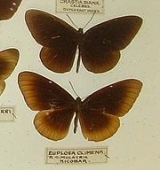
Nicobar Crow
Encyclopedia
The Nicobar Crow is a species of nymphalid
butterfly
in the Danainae subfamily. It is endemic to the Nicobar Islands
of India
.
The following description is from Bingham (1907) and represents only the forms described under Euploea climena simulatrix.
Male and female: Shape of wings more or less as in E. modesta, dorsum straighter near tornus in male. Upperside dark brown, the margins broadly paler; Female altogether paler than the male; fore and hind wing in male uniform unspotted, in female with a small pinkish-white costal spot. Underside : ground-colour similar ; fore wing: a spot at apex of discoidal cell, a small costal spot, and three discal spots bluish white. Hind wing: a bluish-white spot at apex of discoidal cell with five or six discal spots beyond. Antennae, head, thorax and abdomen very dark brown, almost black head, thorax and abdomen spotted with white.
Nymphalidae
The Nymphalidae is a family of about 5,000 species of butterflies which are distributed throughout most of the world. These are usually medium sized to large butterflies. Most species have a reduced pair of forelegs and many hold their colourful wings flat when resting. They are also called...
butterfly
Butterfly
A butterfly is a mainly day-flying insect of the order Lepidoptera, which includes the butterflies and moths. Like other holometabolous insects, the butterfly's life cycle consists of four parts: egg, larva, pupa and adult. Most species are diurnal. Butterflies have large, often brightly coloured...
in the Danainae subfamily. It is endemic to the Nicobar Islands
Nicobar Islands
The Nicobar Islands are an archipelagic island chain in the eastern Indian Ocean...
of India
India
India , officially the Republic of India , is a country in South Asia. It is the seventh-largest country by geographical area, the second-most populous country with over 1.2 billion people, and the most populous democracy in the world...
.
Description
- See glossaryGlossary of Lepidopteran termsThis glossary describes the terms used in the formal descriptions of insect species, jargon used mostly by professionals or entomologist....
for terms used
The following description is from Bingham (1907) and represents only the forms described under Euploea climena simulatrix.
Male and female: Shape of wings more or less as in E. modesta, dorsum straighter near tornus in male. Upperside dark brown, the margins broadly paler; Female altogether paler than the male; fore and hind wing in male uniform unspotted, in female with a small pinkish-white costal spot. Underside : ground-colour similar ; fore wing: a spot at apex of discoidal cell, a small costal spot, and three discal spots bluish white. Hind wing: a bluish-white spot at apex of discoidal cell with five or six discal spots beyond. Antennae, head, thorax and abdomen very dark brown, almost black head, thorax and abdomen spotted with white.
Source
- Lepidoptera Specialist Group 1996. Euploea scherzeri. 2006 IUCN Red List of Threatened Species. Downloaded on 31 July 2007.

